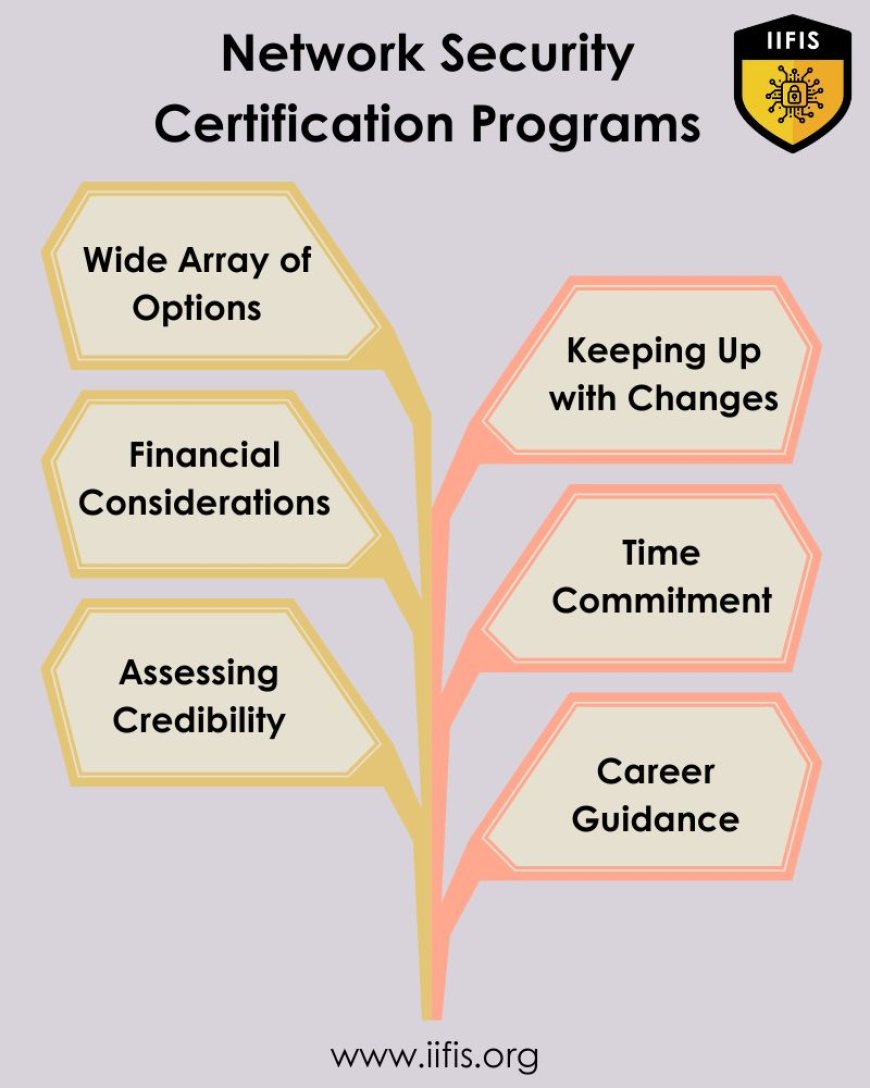Core Competencies in Network Security Certification Programs
Discover the essentials of network security certification programs. Explore core competencies and skills for a robust cybersecurity career.

Network security certification programs are crucial for verifying experts' proficiency in safeguarding digital networks. These certificates attest to the proficiency with the security precautions that may be implemented, protecting networks from ever-changing cyber threats. They create confidence and trust in their capacity to protect confidential information and open doors to improved work chances. Compliance requirements frequently require specific certifications in many kinds of businesses, highlighting their significance in maintaining regulatory conformance.
These programs also allow for specialization in fields like safe network engineering or ethical hacking, which promotes ongoing learning to keep up with changing trends. Opportunities for networking within the cybersecurity community allow the sharing of knowledge and help in keeping up with industry advancements, which fosters professional development and career advancement.
Discuss the challenges faced by individuals in choosing the right network security certification program.
-
Wide Array of Options: For people, the sheer quantity of network security certification programs available can be debilitating. It can be difficult to choose through all of the possibilities to discover the one that best matches your experience level and professional goals.
-
Keeping Up with Changes: Novel dangers and technology continue to develop in the field of cybersecurity. Because the sector is so dynamic, certification programs must update and modify their curriculum to stay current. It could be difficult for people to select an educational program that offers the latest information and skills.
-
Financial Considerations: Obtaining a network security certification is frequently an expensive endeavor. It might cost a lot of money to take the exam, from registration fees to study materials and other costs. People need to consider this expense in their financial resources and plan.
-
Time Commitment: A certification exam demands significant time and effort to prepare for and pass. It can be difficult to manage study time with other personal and professional obligations, particularly for people with busy schedules.
-
Assessing Credibility: Evaluating the reliability and standing of each certification provider and program can be challenging due to the availability of options. People who want to make sure they select a respectable certification program that is valued by companies should do a lot of research and ask for suggestions.
-
Career Guidance: For some people, it might be difficult to determine which qualifications are most appropriate for a certain career path due to a lack of clear direction. Without the right assistance, people could find it difficult to select the certification program that most closely matches their professional goals.

What are the core competencies required in network security?
-
Technical Proficiency:
Networking fundamentals, such as TCP/IP protocols, routing, switching, and network structure, must be fully understood by network security specialists. They should be adept in setting up and maintaining intrusion detection/prevention systems, firewalls, and other security devices.
-
Cybersecurity Knowledge:
It is important to have a solid understanding of cybersecurity best practices and concepts. This involves being informed about threat detection strategies, incident response protocols, access control systems, and encryption methods.
-
Vulnerability Assessment and Management:
Experts in network security need to be ready to recognize, evaluate, and address problems in systems and network infrastructure. Fix safety issues, this involves performing routine penetration tests, security scans, and patch and update implementation.
-
Security Policy Development:
To keep a network environment secure, security rules and procedures must be developed and put into place. Network security experts should be ready to draft thorough security policies that satisfy organizational requirements and maintain conformance to industry rules and guidelines.
-
Incident Response and Forensics:
Network security experts must react quickly and efficiently in the case of a security incident or breach. This is looking into security incidents, examining forensic information, and putting precautions in place to stop them from happening again.
-
Risk Management:
It is important to understand risk factors and evaluate possible risks to network security. Professionals in network security should be able to assess risks, rank them according to possible implications, and create plans to successfully reduce or manage them.
-
Communication Skills:
Network security experts must communicate effectively to work as a team, suggest non-technical stakeholders about security-related matters, and inform users of security best practices.
-
Continuous Learning and Adaptability:
Network security is a field that is always changing due to the continual development of new technology and threats. To effectively protect the network's systems against new dangers, network security professionals need to be flexible and support continuous learning. This means they need to be up to date on the latest technologies, trends, and methods.
Advantages of Network Security Certifications in the job market
Validation of Skills:
-
Certifications attest to a professional's proficiency in network security and give companies concrete proof of their skills and knowledge. The person becomes more credible and appealing to employers as a result of this validation.
Competitive Edge:
-
Possessing relevant certificates helps candidates stand out from the competition in a competitive employment market. Candidates with certifications are frequently given preference by employers because they show a dedication to lifelong learning and professional growth.
Expanded Job Opportunities:
-
For positions in network security, many businesses choose or demand people with certain certifications. Professionals can work in cybersecurity consulting firms, government organizations, financial institutions, and technology businesses, among other places, if they possess these certificates.
Higher Earning Potential:
-
Experts who hold certifications in network security usually fetch better compensation than those who do not. Because certified experts have a proven track record of competence and efficiently manage cybersecurity risks, employers are willing to pay a premium for such.
Career Advancement:
-
Opportunities for job progress can be improved by certifications. They provide people with the know-how required to take on increasingly difficult positions like cybersecurity managers, penetration testers, network security analysts, and security engineers.
Compliance Requirements:
-
Certain certificates could be required in regulated industries including government, healthcare, and finance to verify compliance with rules and guidelines. Professionals looking for work in these fields must possess these certificates.
Global Recognition:
-
Professionals can explore employment prospects worldwide thanks to the international recognition of many network security certifications. This general knowledge improves mobility and creates job chances across various regions.
Network Security Certifications are essential in today's job market since they verify professionals' abilities, boost their marketability, and increase employment prospects. These credentials offer verifiable proof of competence, which gives employers peace of mind and creates avenues for career growth and higher-paying jobs. In addition, certifications confirm respect for industry norms and laws, which increases a candidate's attractiveness as a candidate for positions in regulated industries like banking, healthcare, and government. Network security certificates, with their widespread acceptance and continued significance in the dynamic field of cybersecurity, allow professionals to prosper in a quickly changing environment and make valuable contributions to the global protection of digital networks.
























